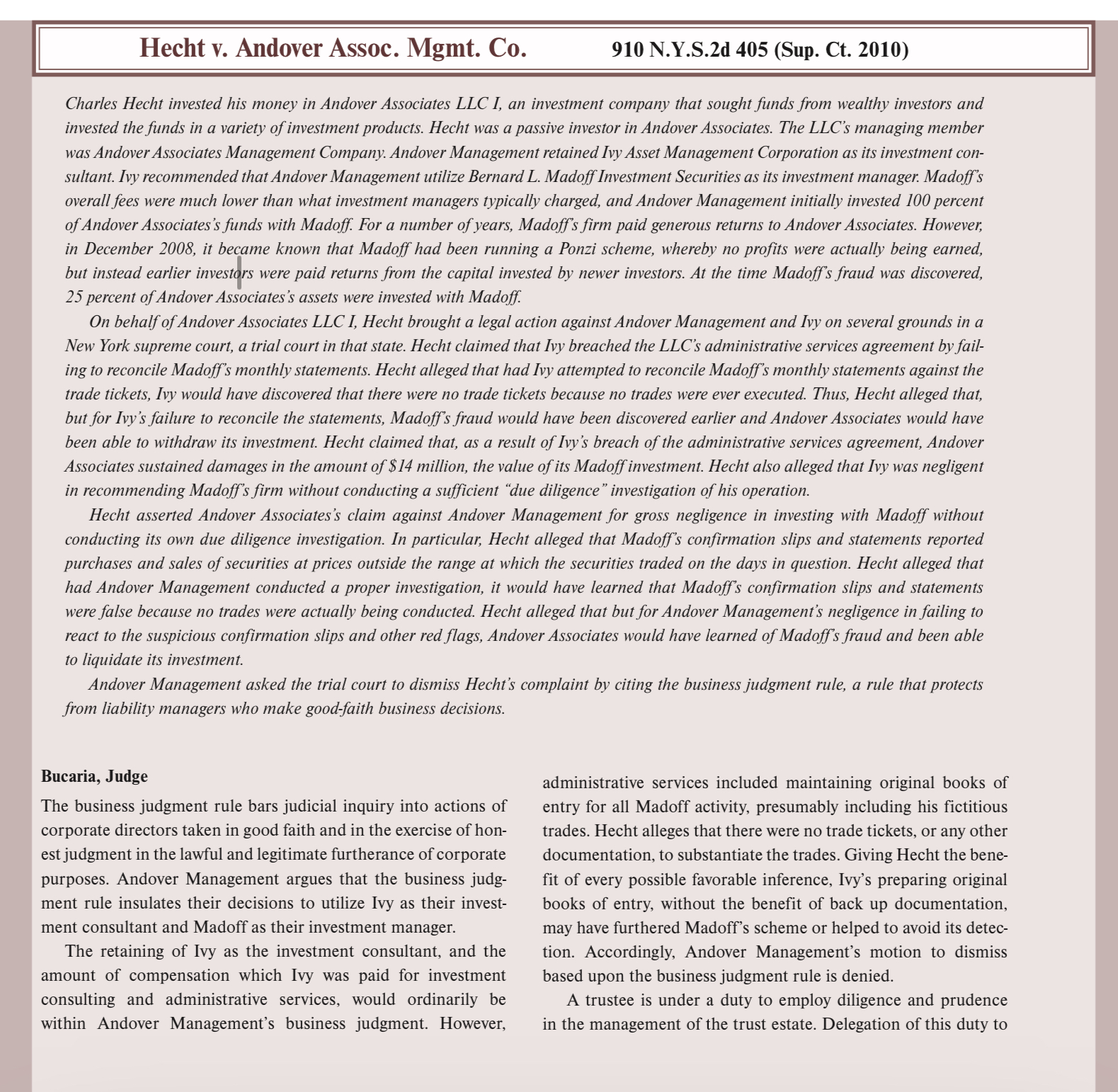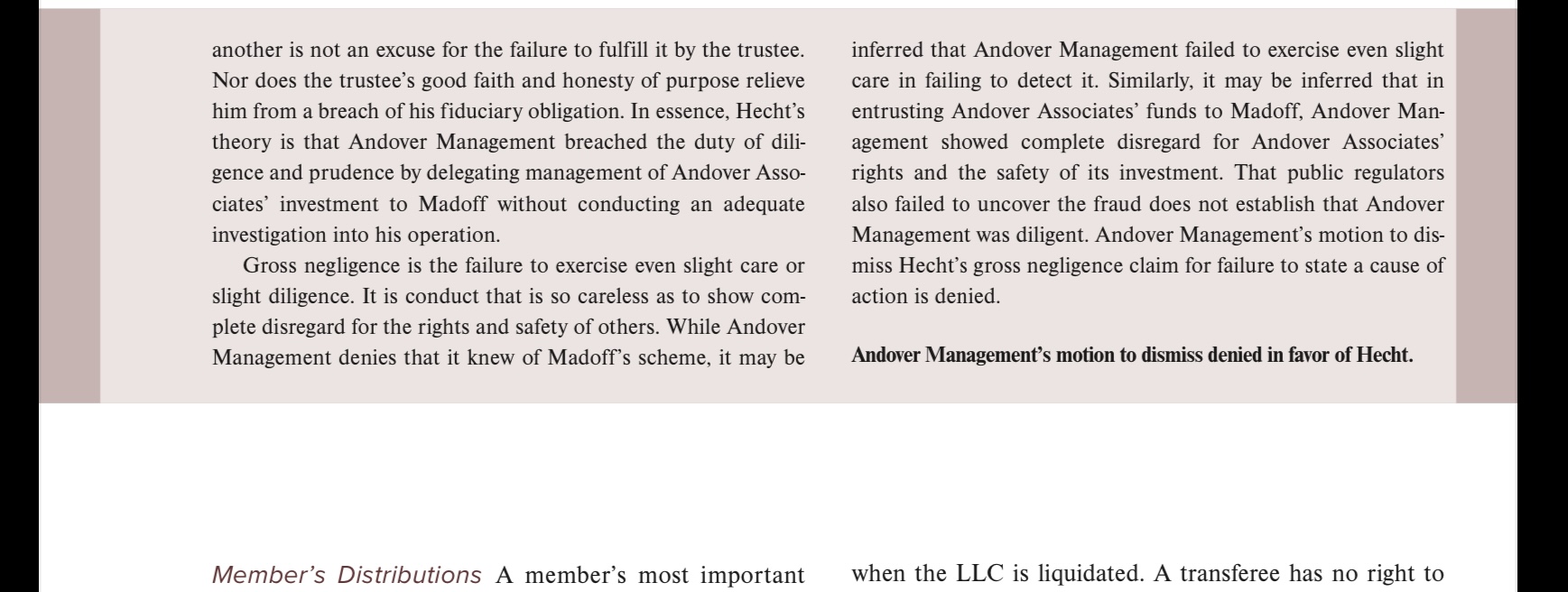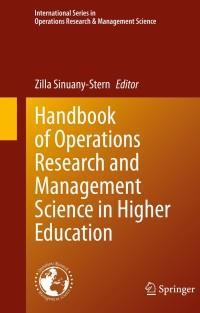Answered step by step
Verified Expert Solution
Question
1 Approved Answer
Please IRAC this brief Charles Hecht invested his money in Andover Associates LLC I, an investment company that sought funds from wealthy investors and invested
Please IRAC this brief

 Charles Hecht invested his money in Andover Associates LLC I, an investment company that sought funds from wealthy investors and invested the funds in a variety of investment products. Hecht was a passive investor in Andover Associates. The LLC's managing member was Andover Associates Management Company. Andover Management retained Ivy Asset Management Corporation as its investment consultant. Ivy recommended that Andover Management utilize Bernard L. Madoff Investment Securities as its investment manager. Madoff's overall fees were much lower than what investment managers typically charged, and Andover Management initially invested 100 percent of Andover Associates's funds with Madoff. For a number of years, Madoff's firm paid generous returns to Andover Associates. However, in December 2008, it became known that Madoff had been running a Ponzi scheme, whereby no profits were actually being earned, but instead earlier investors were paid returns from the capital invested by newer investors. At the time Madoff's fraud was discovered, 25 percent of Andover Associates's assets were invested with Madoff. On behalf of Andover Associates LLC I, Hecht brought a legal action against Andover Management and Ivy on several grounds in a New York supreme court, a trial court in that state. Hecht claimed that Ivy breached the LLC's administrative services agreement by failing to reconcile Madoff's monthly statements. Hecht alleged that had Ivy attempted to reconcile Madoff's monthly statements against the trade tickets, Ivy would have discovered that there were no trade tickets because no trades were ever executed. Thus, Hecht alleged that, but for Ivy's failure to reconcile the statements, Madoff's fraud would have been discovered earlier and Andover Associates would have been able to withdraw its investment. Hecht claimed that, as a result of Ivy's breach of the administrative services agreement, Andover Associates sustained damages in the amount of \$14 million, the value of its Madoff investment. Hecht also alleged that Ivy was negligent in recommending Madoff's firm without conducting a sufficient "due diligence" investigation of his operation. Hecht asserted Andover Associates's claim against Andover Management for gross negligence in investing with Madoff without conducting its own due diligence investigation. In particular, Hecht alleged that Madoff's confirmation slips and statements reported purchases and sales of securities at prices outside the range at which the securities traded on the days in question. Hecht alleged that had Andover Management conducted a proper investigation, it would have learned that Madoff's confirmation slips and statements were false because no trades were actually being conducted. Hecht alleged that but for Andover Management's negligence in failing to react to the suspicious confirmation slips and other red flags, Andover Associates would have learned of Madoff's fraud and been able to liquidate its investment. Andover Management asked the trial court to dismiss Hecht's complaint by citing the business judgment rule, a rule that protects from liability managers who make good-faith business decisions. Bucaria, Judge The business judgment rule bars judicial inquiry into actions of corporate directors taken in good faith and in the exercise of honest judgment in the lawful and legitimate furtherance of corporate purposes. Andover Management argues that the business judgment rule insulates their decisions to utilize Ivy as their investment consultant and Madoff as their investment manager. The retaining of Ivy as the investment consultant, and the amount of compensation which Ivy was paid for investment consulting and administrative services, would ordinarily be within Andover Management's business judgment. However, administrative services included maintaining original books of entry for all Madoff activity, presumably including his fictitious trades. Hecht alleges that there were no trade tickets, or any other documentation, to substantiate the trades. Giving Hecht the benefit of every possible favorable inference, Ivy's preparing original books of entry, without the benefit of back up documentation, may have furthered Madoff's scheme or helped to avoid its detection. Accordingly, Andover Management's motion to dismiss based upon the business judgment rule is denied. A trustee is under a duty to employ diligence and prudence in the management of the trust estate. Delegation of this duty to another is not an excuse for the failure to fulfill it by the trustee. Nor does the trustee's good faith and honesty of purpose relieve him from a breach of his fiduciary obligation. In essence, Hecht's theory is that Andover Management breached the duty of diligence and prudence by delegating management of Andover Associates' investment to Madoff without conducting an adequate investigation into his operation. Gross negligence is the failure to exercise even slight care or slight diligence. It is conduct that is so careless as to show complete disregard for the rights and safety of others. While Andover Management denies that it knew of Madoff's scheme, it may be inferred that Andover Management failed to exercise even slight care in failing to detect it. Similarly, it may be inferred that in entrusting Andover Associates' funds to Madoff, Andover Management showed complete disregard for Andover Associates' rights and the safety of its investment. That public regulators also failed to uncover the fraud does not establish that Andover Management was diligent. Andover Management's motion to dismiss Hecht's gross negligence claim for failure to state a cause of action is denied. Andover Management's motion to dismiss denied in favor of Hecht. Member's Distributions A member's most important when the LLC is liquidated. A transferee has no right to
Charles Hecht invested his money in Andover Associates LLC I, an investment company that sought funds from wealthy investors and invested the funds in a variety of investment products. Hecht was a passive investor in Andover Associates. The LLC's managing member was Andover Associates Management Company. Andover Management retained Ivy Asset Management Corporation as its investment consultant. Ivy recommended that Andover Management utilize Bernard L. Madoff Investment Securities as its investment manager. Madoff's overall fees were much lower than what investment managers typically charged, and Andover Management initially invested 100 percent of Andover Associates's funds with Madoff. For a number of years, Madoff's firm paid generous returns to Andover Associates. However, in December 2008, it became known that Madoff had been running a Ponzi scheme, whereby no profits were actually being earned, but instead earlier investors were paid returns from the capital invested by newer investors. At the time Madoff's fraud was discovered, 25 percent of Andover Associates's assets were invested with Madoff. On behalf of Andover Associates LLC I, Hecht brought a legal action against Andover Management and Ivy on several grounds in a New York supreme court, a trial court in that state. Hecht claimed that Ivy breached the LLC's administrative services agreement by failing to reconcile Madoff's monthly statements. Hecht alleged that had Ivy attempted to reconcile Madoff's monthly statements against the trade tickets, Ivy would have discovered that there were no trade tickets because no trades were ever executed. Thus, Hecht alleged that, but for Ivy's failure to reconcile the statements, Madoff's fraud would have been discovered earlier and Andover Associates would have been able to withdraw its investment. Hecht claimed that, as a result of Ivy's breach of the administrative services agreement, Andover Associates sustained damages in the amount of \$14 million, the value of its Madoff investment. Hecht also alleged that Ivy was negligent in recommending Madoff's firm without conducting a sufficient "due diligence" investigation of his operation. Hecht asserted Andover Associates's claim against Andover Management for gross negligence in investing with Madoff without conducting its own due diligence investigation. In particular, Hecht alleged that Madoff's confirmation slips and statements reported purchases and sales of securities at prices outside the range at which the securities traded on the days in question. Hecht alleged that had Andover Management conducted a proper investigation, it would have learned that Madoff's confirmation slips and statements were false because no trades were actually being conducted. Hecht alleged that but for Andover Management's negligence in failing to react to the suspicious confirmation slips and other red flags, Andover Associates would have learned of Madoff's fraud and been able to liquidate its investment. Andover Management asked the trial court to dismiss Hecht's complaint by citing the business judgment rule, a rule that protects from liability managers who make good-faith business decisions. Bucaria, Judge The business judgment rule bars judicial inquiry into actions of corporate directors taken in good faith and in the exercise of honest judgment in the lawful and legitimate furtherance of corporate purposes. Andover Management argues that the business judgment rule insulates their decisions to utilize Ivy as their investment consultant and Madoff as their investment manager. The retaining of Ivy as the investment consultant, and the amount of compensation which Ivy was paid for investment consulting and administrative services, would ordinarily be within Andover Management's business judgment. However, administrative services included maintaining original books of entry for all Madoff activity, presumably including his fictitious trades. Hecht alleges that there were no trade tickets, or any other documentation, to substantiate the trades. Giving Hecht the benefit of every possible favorable inference, Ivy's preparing original books of entry, without the benefit of back up documentation, may have furthered Madoff's scheme or helped to avoid its detection. Accordingly, Andover Management's motion to dismiss based upon the business judgment rule is denied. A trustee is under a duty to employ diligence and prudence in the management of the trust estate. Delegation of this duty to another is not an excuse for the failure to fulfill it by the trustee. Nor does the trustee's good faith and honesty of purpose relieve him from a breach of his fiduciary obligation. In essence, Hecht's theory is that Andover Management breached the duty of diligence and prudence by delegating management of Andover Associates' investment to Madoff without conducting an adequate investigation into his operation. Gross negligence is the failure to exercise even slight care or slight diligence. It is conduct that is so careless as to show complete disregard for the rights and safety of others. While Andover Management denies that it knew of Madoff's scheme, it may be inferred that Andover Management failed to exercise even slight care in failing to detect it. Similarly, it may be inferred that in entrusting Andover Associates' funds to Madoff, Andover Management showed complete disregard for Andover Associates' rights and the safety of its investment. That public regulators also failed to uncover the fraud does not establish that Andover Management was diligent. Andover Management's motion to dismiss Hecht's gross negligence claim for failure to state a cause of action is denied. Andover Management's motion to dismiss denied in favor of Hecht. Member's Distributions A member's most important when the LLC is liquidated. A transferee has no right to Step by Step Solution
There are 3 Steps involved in it
Step: 1

Get Instant Access to Expert-Tailored Solutions
See step-by-step solutions with expert insights and AI powered tools for academic success
Step: 2

Step: 3

Ace Your Homework with AI
Get the answers you need in no time with our AI-driven, step-by-step assistance
Get Started


